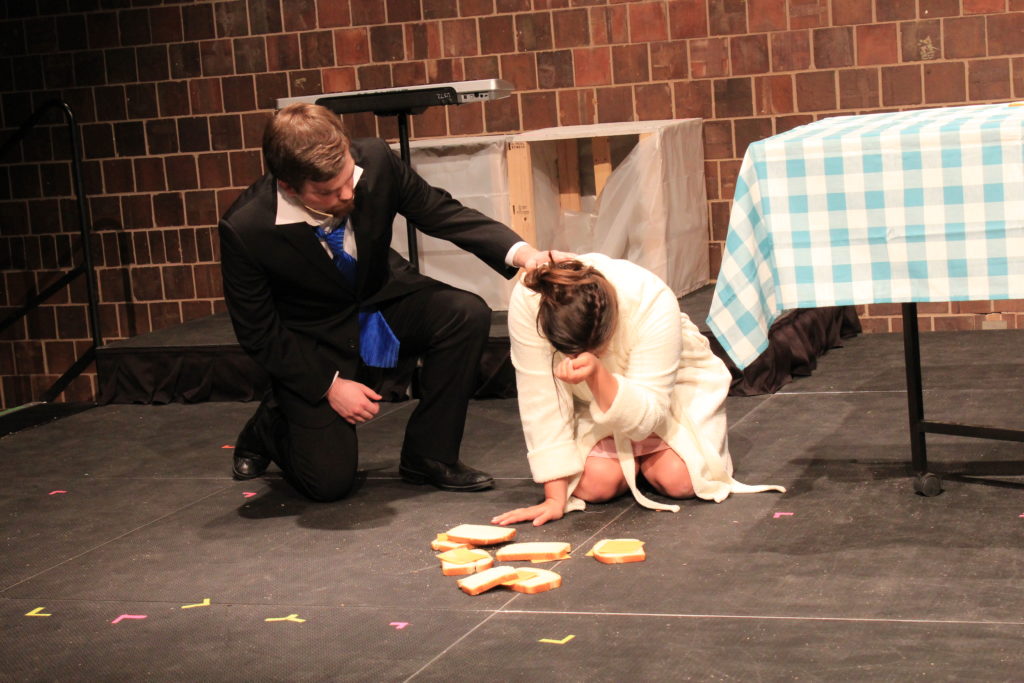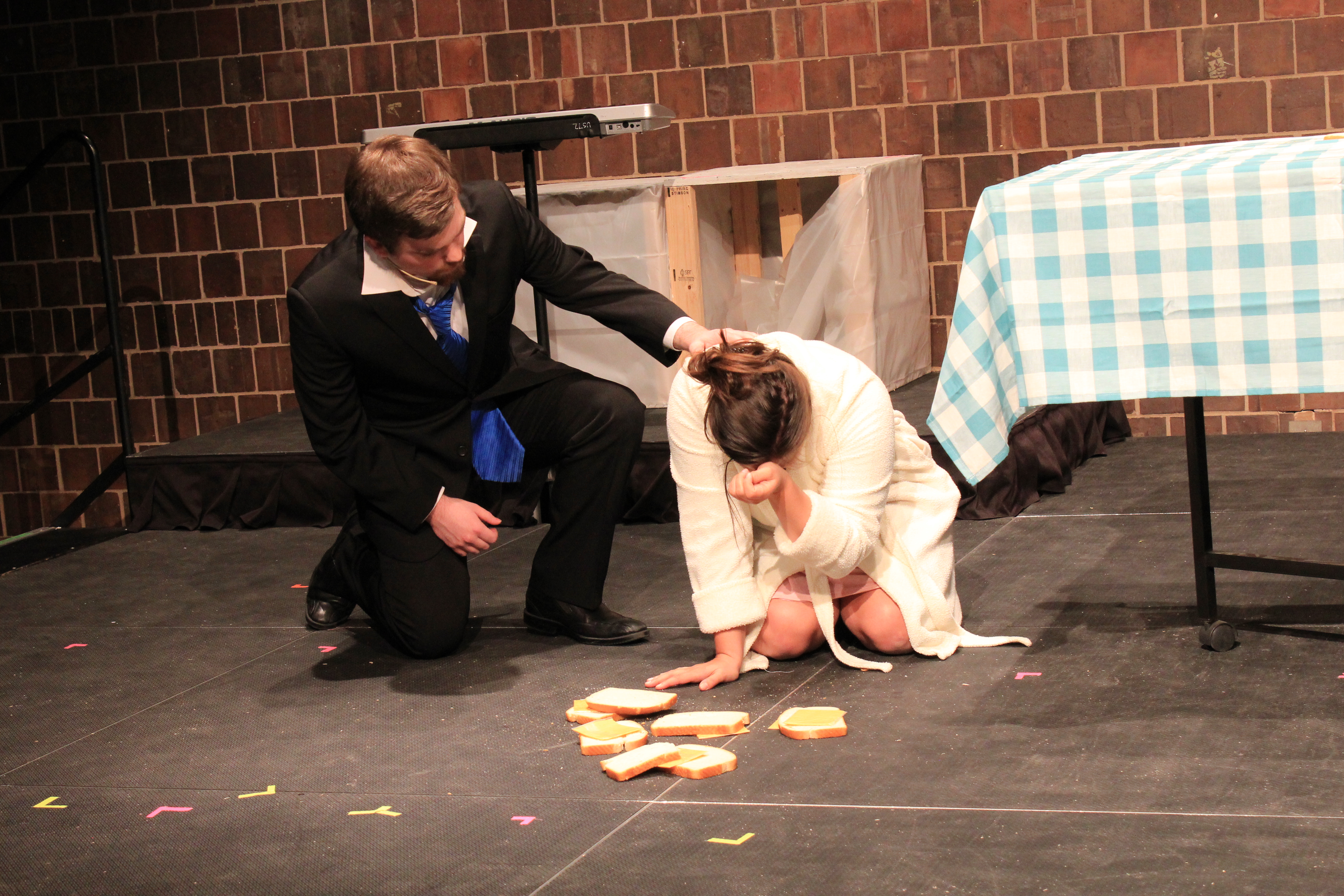It isn’t common for musicals to be prefaced with warnings to the audience beyond those about fire exits or the use strobe lights. So you had to wonder what exactly lay ahead when this past Friday and Saturday, the warnings preceding ROC Players’ production of “Next to Normal” included a mention of the availability of UCC counselors should the show prove traumatic to a viewer.
Some might scoff at the idea of a musical causing such mental duress, but the intensity of “Next to Normal” sets it apart from most musicals due to the impact it is capable of making on an audience.
This spurred some concerns from mental health education group Active Minds when ROC Players chose to put on this show.
“When I petitioned to do [the show], I mentioned to the Executive Board of ROC Players that I would love to cosponsor with another psychology or psychiatry related group on campus such as Active Minds,” said director and senior Zach Stuckelman. “[Active Minds] got back to me expressing their concerns and apprehension towards the production.”
Stuckelman added: “They had concerns with regards to the sensitive materials contained in the show, and whether they could be triggering to the audience. Additionally, they were concerned about the audience generalizing the story of the musical to all those who struggle with mental illness.”
Active Minds declined to cosponsor, but tried to help make the show an opportunity to promote discussion on mental health.
“Although we agreed as an e-board that we couldn’t cosponsor, a couple of us decided to help as individuals. We helped out with the dramaturgy packet, tabled the first night of the show, and participated in a talkback to dispel some of the myths about mental illness that the show perpetuates,” said senior and Active Minds President Allison Friske.
Their voicing of concerns was not in an attempt to stop the show’s production, but instead to help it serve as an effective conversation starter about the mental health.
“We appreciate freedom of expression, but we also wanted to make sure that we defeated some stigma about mental health while we worked with them,” said Friske. “Both groups agree that we want to work together in the future as well.”
The show opens with the Goodman family, consisting of husband and wife Dan and Diana (played by freshman Casey Brentnall and Eastman senior Cassidy Thompson respectively), their daughter Natalie (played by sophomore Jane Huffer), and their son (senior Tom Downey).
The opening number “Just Another Day” introduces us to the dysfunctional default state of a day in the lives of the Goodmans, with Dan and Natalie expressing confusion and frustration with Diana’s erratic and irregular behavior. The son, however, seems aloof and almost entertained by Diana’s oddness up until she goes to the floor in some sort of trance while making sandwiches, at which point she is unresponsive to anyone but him. This opening song introduces the core characters and performers well, showcasing ROC Players’ thoughtful casting of the show.
As the first act progresses, we get a deeper look into the nature of Diana’s psychological problems. “My Psychopharmacologist and I” and “I Miss the Mountains” detail her internal commotion as well as outline her frustration with the treatment she has been receiving. “I miss the dizzy heights / All the manic, magic days / And the dark, depressing nights,” she sings on “I Miss the Mountains,” describing how her medication has stripped her of all feeling in the process of stabilizing her.
A new character, Henry, is introduced part way through the act as a romantic interest of Natalie’s, who keeps him far away from her family out of embarrassment about her mother. When Henry finally does meet the Goodmans, he is greeted by Diana bringing out a birthday cake for her son. It is then revealed by Natalie and Dan that the son has been dead for 16 years, and that all of his appearances in the show are as an apparition in Diana’s own head. This is a moment that really pivots the show into increasingly darker territory.
The latter half of the first act sees Diana’s son taking more and more control of her mind, with him encouraging her to throw away her pills and toward the end of the act, luring her into a suicide attempt so she can be in his world. This scene, taking place during “There’s a World,” serves as an excellent example of juxtaposition between the musical mood and subject matter of the lyrics, a technique that’s employed well throughout the show.
The use of the son as an actual character on stage also serves as an excellent device for the portrayal of Diana versus her mind, allowing all the animosity and all the love Diana has for herself to be brought to life through interactions between her and her son.
The end of the first act and beginning of the second deal with Diana’s treatment surrounding her suicide attempt: seeing a new doctor and undergoing electroconvulsive therapy. “Make Up Your Mind”, “Seconds and Years”, and “Better than Before” are welcome group numbers after a more solo and duo heavy first half, with junior Dan Bennett coming more into the musical fray as Doctor Madden.
Post-electrotherapy, Diana suffers significant memory loss, carving a large divide between her and Dan. This parallels a distance that is growing between Natalie and Henry, the two conflicts being portrayed elegantly on “Why Stay?”
The show concludes on a positive but realistic note, with Diana leaving to live with her parents on “So Anyway,” one of the show’s softest and most heartbreaking moments due to how bluntly it exposes the futility and unhealthiness of Dan’s attempts to help Diana throughout the show, despite his good intentions.
“Next to Normal” is a rollercoaster from start to finish. Its effectiveness in portraying just how confusing and terrifying mental health problems can be for those they affect and how hard it can be to find resolutions to the those issues was captured well by the ROC Players production. There were some occasional performance inconsistencies and some loose choreography, but these did not detract from the impact of the show much, if at all.
The input and assistance from Active Minds combined with the thoughtful direction of the show were effective in preventing the portrayals of mental illness from being problematic and instead allowed them to serve as potent and eye opening anecdotes.
Boundary pushing shows like this bring an entirely new dimension to musical theater, and the performance of more of such shows on campus would be most welcome from the likes of ROC Players in the future.


